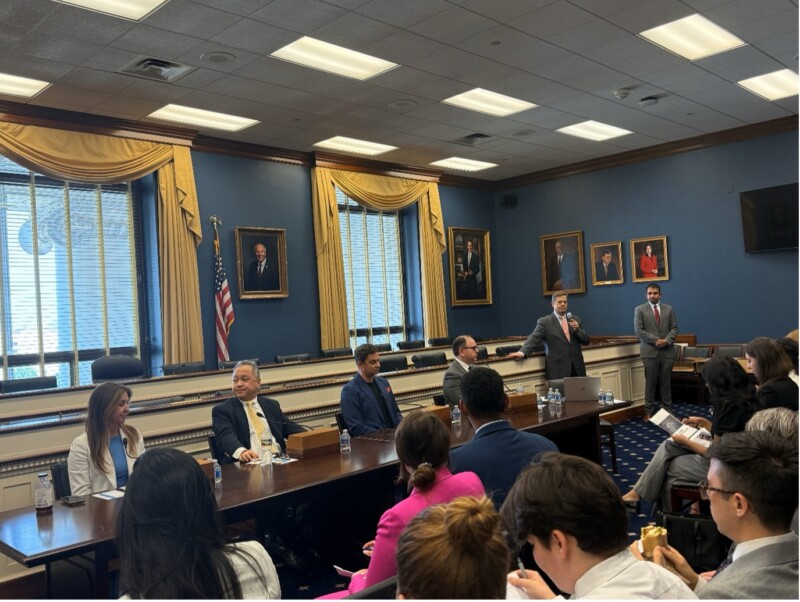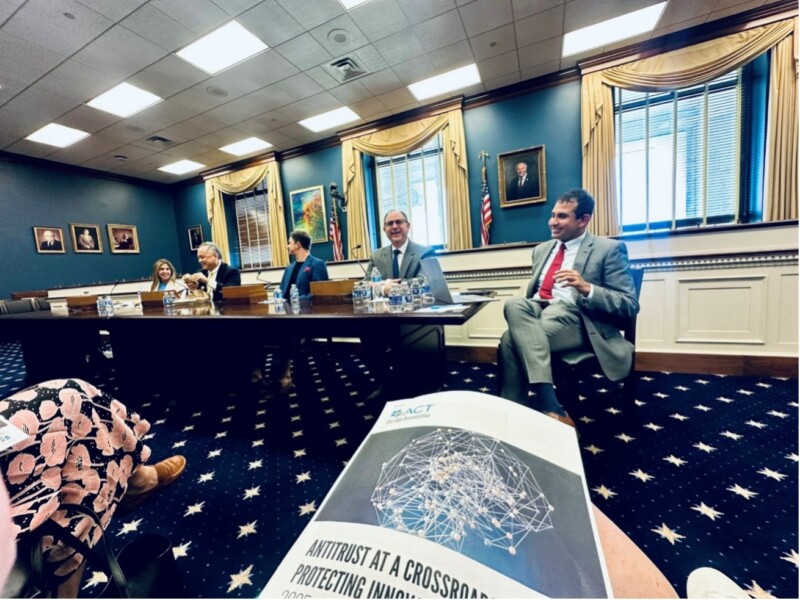On June 12, 2025, ACT | The App Association held a standing-room-only Hill briefing, Getting AI Policy Right: A Roadmap for Innovation, Investment, and Competition, where we released our latest white paper, Antitrust at a Crossroads: Protecting Innovation in the AI Era, laying out a framework for antitrust policy that supports, rather than sidelines, American AI innovation.
The panel brought together technologists, legal experts, and startup leaders who delivered a clear message: broad, preemptive antitrust proposals risk doing more harm than good, especially for the small and growing companies driving today’s AI progress.

The briefing opened with remarks from Morgan Reed, president of the App Association, who framed the conversation around small business impact:
“Our goal today is to help you and your offices understand how AI is being used by small businesses in your district—and how it’s part of the next level of solutions.”
Following opening remarks, Kedhar Sankararaman, policy associate at the App Association, moderated a conversation with:

Two major themes from the conversation:
Panelists pushed back on the growing narrative that AI markets are inherently monopolized. “You don’t need a billion-dollar model to solve a problem,” said Scott, who explained how small models optimized for specific use cases often outperform the largest systems, and how startups are innovating faster at the application layer.
Jessica drew a stark contrast between U.S. and EU approaches. She pointed to the Digital Markets Act (DMA) as a cautionary tale of policy being drafted with good intentions but that in practice has harmed innovation by slowing software updates and undermining the managed marketplace options small businesses prefer.
Andrei shared a founder’s perspective highlighting how for most startups, the acquisition isn’t failure, it’s the plan. Without clear, flexible merger policy, he warned that early-stage companies risk losing both funding and negotiating power.
Christopher explained why per se antitrust bans—declaring broad categories of conduct illegal without examining their effects in every instance because they always or almost always create antitrust—don’t make sense for AI. In particular, he pointed out that markets for AI services are new and quickly evolving, which means we lack the collective experience and settled practice of applying antitrust law to them necessary to determine whether a per se ban ought to be adopted or even considered. More importantly, Christopher pointed out that what we do know about the markets for AI services thus far is that they are highly competitive and have organized themselves into layers with vertical integration. The steps competitors have taken to vertically integrate and invest have demonstrably increased efficiency and improved product offerings. When a given category of conduct results primarily in procompetitive benefits, courts and policymakers will—and should—decline to adopt per se bans on that activity.
Our latest white paper, Antitrust at a Crossroads: Protecting Innovation in the AI Era, lays out a blueprint for risk-based, evidence-driven competition policy that works for fast-moving markets like AI.
Key recommendations for policymakers include:
The paper also details how recent activity, such as the DOJ’s suggested remedies in the Google Search antitrust case and the FTC’s Amazon lawsuit, risk raising costs, weakening security, and undermining innovation across the AI economy.
Download the white paper here.
With more than 1,000 AI-related bills advancing at the state level and Congress skeptical of imposing restrictions on measures that treat AI differently from other technologies, the stakes couldn’t be higher. As the United States looks to maintain its global AI lead, policymakers must ensure their interventions don’t inadvertently freeze the flywheel that’s made American innovation so resilient.
We’ll continue to advocate for policy that recognizes the real structure of AI markets, and the real needs of the small businesses building them.
Stay tuned for more insights from the App Association at the intersection of AI, competition, and small business innovation.




